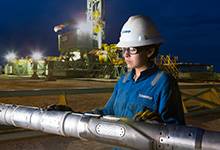Schlumberger New High-Definition Imaging-While-Drilling Service
MicroScope HD service provides detailed logging-while-drilling images for reservoir description and completions optimization.
Schlumberger has announced the release of the MicroScope* HD high-definition imaging-while-drilling service. The MicroScope HD service provides unmatched logging-while-drilling (LWD) imaging for reservoir description to enable detailed fracture characterization and completion optimization in conductive drilling fluids for all well types, including horizontal and highly deviated wells.
“In unconventional and carbonate reservoirs it is critical for geologists to fully understand the fracture networks that may challenge drilling operations and those that will contribute to production,” said Steve Kaufmann, president, Drilling & Measurements, Schlumberger. “This newly developed MicroScope HD technology provides detailed imaging of the formation to help prevent drilling risks, optimize completion design and potentially increase production.”
The MicroScope HD service enables detailed formation structural modeling to identify fracture orientation that contributes to production. An understanding of how formations are deposited is further enhanced with the service through sedimentology analysis. For fracture characterization, the MicroScope HD service delivers dimensions of fractures, which provides geologists a better understanding of the fracture network.
The MicroScope HD service has been field tested extensively in reservoirs in the Middle East, Europe and Africa, as well as unconventional reservoirs in North America. More than 45 job runs have been completed, confirming that high-definition images can be obtained reliably in conductive mud environments while drilling in oil and gas carbonate, sandstone and unconventional reservoirs.
In the Middle East, Petroleum Development Oman (PDO) was experiencing heavy mud losses while drilling a well in an onshore carbonate reservoir. The MicroScope HD service provided high-definition images to accurately identify intervals with mud losses, which enabled PDO to isolate the challenging zones and optimize the completion design.












